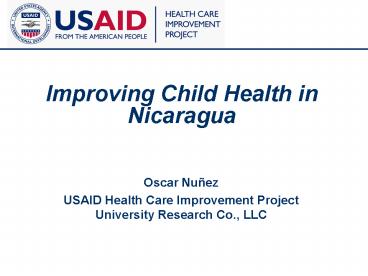Improving Child Health in Nicaragua - PowerPoint PPT Presentation
1 / 11
Title:
Improving Child Health in Nicaragua
Description:
... hospitals and reviewed by national paediatrics faculty ... formal pediatric triage ... competency for clinical management of common pediatric complications ... – PowerPoint PPT presentation
Number of Views:30
Avg rating:3.0/5.0
Title: Improving Child Health in Nicaragua
1
Improving Child Health in Nicaragua
- Oscar Nuñez
- USAID Health Care Improvement Project University
Research Co., LLC
2
Context
- Since 2003, we have implemented a Paediatric
Hospital Improvement (PHI) Collaborative with the
Ministry of Health of Nicaragua and UNICEF - Collaborative began with 6 (out of 22)
maternal-child referral hospitals in Nicaragua
hospitals were selected based on high case
fatality rates and hospital interest in improving
care processes - Today, the collaborative includes 16 maternal
infant hospitals (73 of such hospitals in
Nicaragua) and 28 (58) health centres
3
Problem Analysis
- Prior to 2003, no national guidelines for the
management of critically ill or severely
malnourished children under five - 2003 assessment by national evaluators found
- No emergency triage assessment and treatment
(ETAT) systems in place and little training of
staff in paediatric emergency procedures - 35 of cases incorrectly diagnosed
- Lack of assessment of danger signs and poor
patient monitoring (including during rehydration
for severe diarrhea) - Weak counselling of parents/guardians and local
of follow-up planning at discharge
4
Strategies for Change 1) National Guidelines
- WHO Referral Care manual was adapted for
Nicaragua by our team working with Ministry of
Health pediatricians - Pre-tested with hospitals and reviewed by
national paediatrics faculty - Created pocket version for health personnel
5
Strategies for Change 2) Team Work
- Team formed in each hospital to lead
- PHI work
- Teams conducted self-assessments
- of their compliance with standards
- Learning sessions held with groups of
- hospitals to discuss common problem
- areas, new guidelines, how to measure
improvement, and results - Teams tested changes to improve compliance with
guidelines, including - introducing formal pediatric triage process
- ensuring availability of critical lab tests and
essential drugs - improving staff competency for clinical
management of common pediatric complications
5
6
Strategy for Change 3) Training /monitoring
- Training centers were created in hospitals to
provide in-depth clinical training in management
of acute paediatric illnesses - Paediatric emergency care job aid used in US was
adapted to Nicaragua - Prize for knowledge Contests on knowledge of
case management - Monthly audits of clinical records to assess
compliance with the guidelines
7
Effects of Changes
- Compliance with case management standards for
key pediatric conditions has risen steadily since
the start of the collaborative and has now has
reached high, stable levels across hospitals
8
Effects of Changes
- Trend towards reduction in number of deaths from
key paediatric conditions seen in the same
hospitals. - The most significant declines seen in pneumonia
(55) and respiratory distress syndrome (32)
8
9
Lessons Learnt
- Linking PHI with the Ministry of Healths
Mother-Baby Friendly Hospital Accreditation
Program (supported by UNICEF) has facilitated
sustainability of improvement work - More institutional incentives are needed to
reward and encourage quality champions - Key message Large-scale clinical quality
improvement is possible in developing countries
but greater use of incentives and motivators for
quality improvement may be needed, especially to
induce more - patient-centered care.
10
Acknowledgements
- This work was supported by the U.S. Agency for
International Development (USAID) through the
Quality Assurance Project (2002-2007) and the
USAID Health Care Improvement Project
(2007-2012), both managed by University Research
Co., LLC (URC). - For more information on the paediatric care
improvement work in Nicaragua, contact Dr. Oscar
Nuñez at onunez_at_ibw.com.ni
11
(No Transcript)

